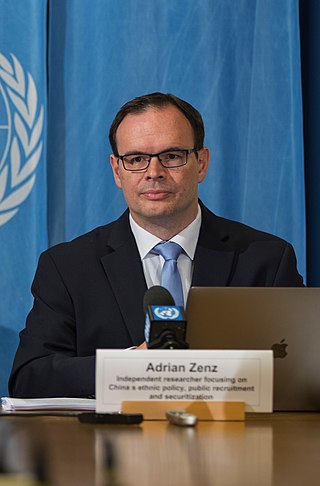Related Research Articles

China is the second most populous country in Asia as well as the second most populous country in the world, with a population of 1,425,671,352.

The one-child policy was a population planning initiative in China implemented between 1979 and 2015 to curb the country's population growth by restricting many families to a single child. The program had wide-ranging social, cultural, economic, and demographic effects, although the contribution of one-child restrictions to the broader program has been the subject of controversy. Its efficacy in reducing birth rates and defensibility from a human rights perspective have been subjects of controversy.

The United Nations Population Fund (UNFPA), formerly the United Nations Fund for Population Activities, is a UN agency aimed at improving reproductive and maternal health worldwide. Its work includes developing national healthcare strategies and protocols, increasing access to birth control, and leading campaigns against child marriage, gender-based violence, obstetric fistula, and female genital mutilation.
Sterilization is any of a number of medical methods of birth control that intentionally leaves a person unable to reproduce. Sterilization methods include both surgical and non-surgical, and exist for both males and females. Sterilization procedures are intended to be permanent; reversal is generally difficult or impossible.

Human population planning is the practice of managing the growth rate of a human population. The practice, traditionally referred to as population control, had historically been implemented mainly with the goal of increasing population growth, though from the 1950s to the 1980s, concerns about overpopulation and its effects on poverty, the environment and political stability led to efforts to reduce population growth rates in many countries. More recently, however, several countries such as China, Japan, South Korea, Russia, Iran, Italy, Spain, Finland, Hungary and Estonia have begun efforts to boost birth rates once again, generally as a response to looming demographic crises.

Family planning is the consideration of the number of children a person wishes to have, including the choice to have no children, and the age at which they wish to have them. Things that may play a role on family planning decisions include marital situation, career or work considerations, financial situations. If sexually active, family planning may involve the use of contraception and other techniques to control the timing of reproduction.

Compulsory sterilization, also known as forced or coerced sterilization, is a government-mandated program to involuntarily sterilize a specific group of people. Sterilization removes a person's capacity to reproduce, and is usually done through surgical procedures. Several countries implemented sterilization programs in the early 20th century. Although such programs have been made illegal in most countries of the world, instances of forced or coerced sterilizations persist.

Like women in many other cultures, women in China have been historically oppressed. For thousands of years, women in China lived under the patriarchal social order characterized by the Confucius teaching of "filial piety". In modern China, the lives of women have changed significantly due to the late Qing dynasty reforms, the changes of the Republican period, the Chinese Civil War, and the rise of the People's Republic of China (PRC).
A two-child policy is a government-imposed limit of two children allowed per family or the payment of government subsidies only to the first two children.
Abortion in China is legal throughout pregnancy and generally accessible nationwide. Abortions are available to most women through China's family planning program, public hospitals, private hospitals, and clinics nationwide. China was one of the first developing countries to permit abortion when the mother’s health was at risk and make it easily accessible under these circumstances in the 1950s. Following the Chinese Communist Revolution and the proclamation of the People's Republic of China in 1949, the country has periodically switched between more restrictive abortion policies to more liberal abortion policies and reversals. Abortion regulations may vary depending on the rules of the province. In an effort to curb sex-selective abortion, Jiangxi and Guizhou restrict non-medically necessary abortions after 14 weeks of pregnancy, while throughout most of China elective abortions are legal after 14 weeks. Although sex-selective abortions are illegal nationwide, they were previously commonplace, leading to a sex-ratio imbalance in China which still exists.

Family planning in India is based on efforts largely sponsored by the Indian government. From 1965 to 2009, contraceptive usage has more than tripled and the fertility rate has more than halved, but the national fertility rate in absolute numbers remains high, causing concern for long-term population growth. India adds up to 1,000,000 people to its population every 20 days. Extensive family planning has become a priority in an effort to curb the projected population of two billion by the end of the twenty-first century.
Human rights in Tibet are a contentious issue. Reported abuses of human rights in Tibet include restricted freedom of religion, belief, and association; arbitrary arrest; maltreatment in custody, including torture; and forced abortion and sterilization. The status of religion, mainly as it relates to figures who are both religious and political, such as the exile of the 14th Dalai Lama, is a regular object of criticism. Additionally, freedom of the press in China is absent, with Tibet's media tightly controlled by the Chinese leadership, making it difficult to accurately determine the scope of human rights abuses.

Population planning in Singapore has reflected various policies to both slow and boost the growth rate of Singapore's population. Singapore first began population planning initiatives in an attempt to slow and reverse the rapid increase in births that began after World War II. Later on, from the 1980s, policy was tailored towards growth, attempting to encourage mothers to have more children. In 2020, the annual total population growth rate in Singapore was -0.3%, and its resident total fertility rate (TFR) was 1.10, below the replacement rate of 2.1.

Women in Peru represent a minority in both numbers and legal rights. Although historically somewhat equal to men, after the Spanish conquest the culture in what is now Peru became increasingly patriarchal. The patriarchal culture is still noticeable. Contraceptive availability is not enough for the demand, and over a third of pregnancies end in abortion. Maternal death rates are also some of the highest in South America.

The National Population Program, known as the National Program for Reproductive Health and Family Planning from 1996 to 1998, was a project conducted in Peru in through the 1990s to reduce population growth as a way of meeting international demographic standards. Plans for the "total extermination" of impoverished Peruvians through sterilization were included in Plan Verde, a covert military operation created to establish a neoliberal military junta. Compulsory sterilization, which is a method that forces individuals to partake in sterilization operations, was the main method employed by the Peruvian government to decrease population.

China's family planning policies have included specific birth quotas as well as harsh enforcements of such quotas. Together, these elements constitute the population planning program of the People's Republic of China. China's program should not be confused with the family planning programs instituted in other countries, which were designed to encourage parents to have the number of children they desired—in China, the provision of contraception through family planning programs was subservient to a birth planning program under which the government designated how many births parents could have in order to control the size of its population.

Globally approximately 45% of those who are married and able to have children use contraception. As of 2007, IUDs were used by about 17% of women of child bearing age in developing countries and 9% in developed countries or more than 180 million women worldwide. Avoiding sex when fertile is used by about 3.6% of women of childbearing age, with usage as high as 20% in areas of South America. As of 2005, 12% of couples are using a male form of contraception with rates of up to 30% in the developed world.

One Child Nation is a 2019 American documentary film directed by Nanfu Wang and Jialing Zhang about the fallout of China's one-child policy that lasted from 1979 to 2015. The documentary is made up of various interviews with former village chiefs, state officials, ex-human traffickers, artists, midwives, journalists, researchers, and victims of the one-child policy. Nanfu Wang stated, in a roundtable discussion, that when creating the film she wanted to do a "360 degree with the policy—people who carried out the policy and people who were the victims of the policy". During the film, Nanfu Wang discovers more about the ties her own family have with the one-child policy, as they unsuccessfully attempt to locate her cousin who was abandoned by her father’s sister in 1989. By the end of the film, Nanfu Wang admits that despite the horrors of the one-child policy, there is an overwhelming acceptance of the policy that remains in China, and a shared attitude that there was no other choice. The closing scenes of the film show the growing propaganda for two child families, presenting the repetition of state interference with family planning within China.

The Chinese government has committed a series of ongoing human rights abuses against Uyghurs and other ethnic and religious minorities in Xinjiang that is often characterized as genocide. Beginning in 2014, the Chinese government, under the administration of Chinese Communist Party (CCP) General Secretary Xi Jinping, incarcerated more than an estimated one million Turkic Muslims without any legal process in internment camps. Operations from 2016 to 2021 were led by Xinjiang CCP Secretary Chen Quanguo. It is the largest-scale detention of ethnic and religious minorities since World War II. The Chinese government began to wind down the camps in 2019. Amnesty International states that detainees have been increasingly transferred to the formal penal system.

Adrian Nikolaus Zenz is a German anthropologist known for his studies of the Xinjiang internment camps and Uyghur genocide. He is a director and senior fellow in China studies at the Victims of Communism Memorial Foundation, an anti-communist think tank established by the US government and based in Washington, DC.
References
- 1 2 3 4 5 6 7 Haworth, Abigail (December 2010). "Breaking China's One-Child Law". Vol. 17, no. 12. Marie Claire. pp. 136–139.
- ↑ "Chinese officials launch campaign to sterilise 10,000". Telegraph.co.uk. 16 April 2010.
- 1 2 Sharp, Peter (23 April 2010). "China To Sterilise 10,000 To Curb Births". Sky News.
- 1 2 3 Bland, Archie (17 April 2010). "Chinese state holds parents hostage in sterilisation drive". Independent.